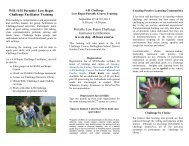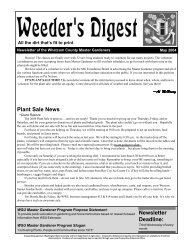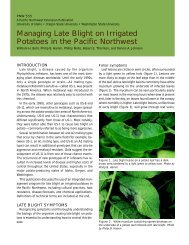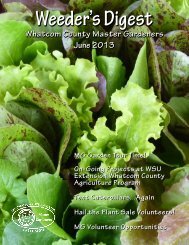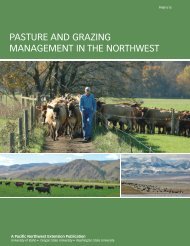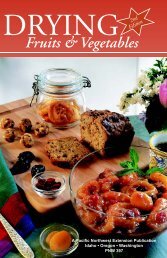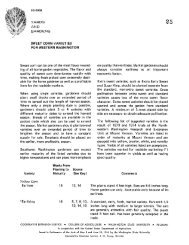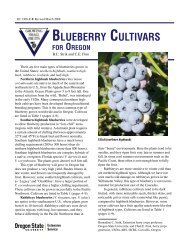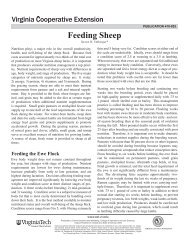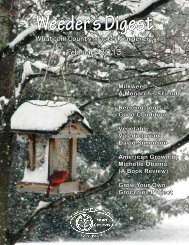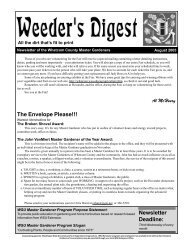Where Does Whatcom County Get its Food? - WSU Whatcom ...
Where Does Whatcom County Get its Food? - WSU Whatcom ...
Where Does Whatcom County Get its Food? - WSU Whatcom ...
You also want an ePaper? Increase the reach of your titles
YUMPU automatically turns print PDFs into web optimized ePapers that Google loves.
quantity of food for a community, they expose children to the science, art, and skill of growing vegetables and<br />
give them a taste of fresh produce. Teachers are incorporating gardens into the curricula of almost all classroom<br />
subjects. For a number of reasons, including lack of processing capacity and health regulations, food from school<br />
gardens cannot currently be served in school cafeterias. However, students growing food are allowed to eat<br />
produce they have grown if they harvest it directly from the garden.<br />
Formed in 2008 as a project of Common Threads Farm, the <strong>Whatcom</strong> <strong>County</strong> School Garden Collective is a group<br />
of teachers and local food advocates working to start school gardens and introduce students to the nutritional<br />
and educational opportunities of food gardening. xiv<br />
New school gardens are being added each year and the success of these gardens depends on the involvement of<br />
teachers and parents. Gardens vary in what they offer: from one to several raised beds, perennial fruit<br />
production, winter production, greenhouses. School gardens that were known in 2010 are listed below.<br />
Bellingham School District<br />
Elementary schools: Geneva, Wade King, Alderwood, Birchwood, Columbia, Parkview, and Roosevelt<br />
Middle schools: Shuksan and Fairhaven<br />
High school: Squalicum<br />
Private schools: Assumption Catholic and Cedartree Montessori<br />
Ferndale School District: Beach Elementary<br />
Lummi Nation: Lummi Nation School<br />
Mount Baker School District: Kendall Elementary School<br />
Western Washington University Gardens<br />
Western Washington University has gardening locations for students and staff. Gardens on campus offer a variety<br />
of opportunities to meet the individual’s interest.<br />
Four main garden projects are run through Fairhaven College’s ‘The Outback Farm Gardens’: The Community<br />
Garden, the Market Garden, the Herb Garden, and the Forest Garden. They are maintained and coordinated by<br />
students and are popular with students and staff. Some classes have activities in the gardens for coursework.<br />
The Community Garden is comprised of roughly 40 small plots, available to students, staff, and faculty, available<br />
on a first-come, first-served basis and free of charge. To be eligible for a plot, individuals must commit to tending<br />
it throughout the summer or else have a plan to pass on responsibility to a known party. No prior gardening<br />
experience is necessary and experimentation (so long as it is organic) is encouraged.<br />
The Market/Educational Garden is an experiment in practical, bio-intensive organic growing. Harvested produce is<br />
sold to faculty and staff at Fairhaven College and on the WWU campus and is also donated to the Bellingham <strong>Food</strong><br />
Bank.<br />
The Herb Garden is located at the entrance to the Outback Farm. A variety of perennial and annual herbs are<br />
grown, planted in plots according to their uses: flu and cold remedies, culinary uses, nervines, and women’s herbs.<br />
The Forest Garden is located at the southeast corner of the Outback Farm. This long-term installation of various<br />
fruit trees and berry plants uses permaculture and biodynamic growing techniques.<br />
37



